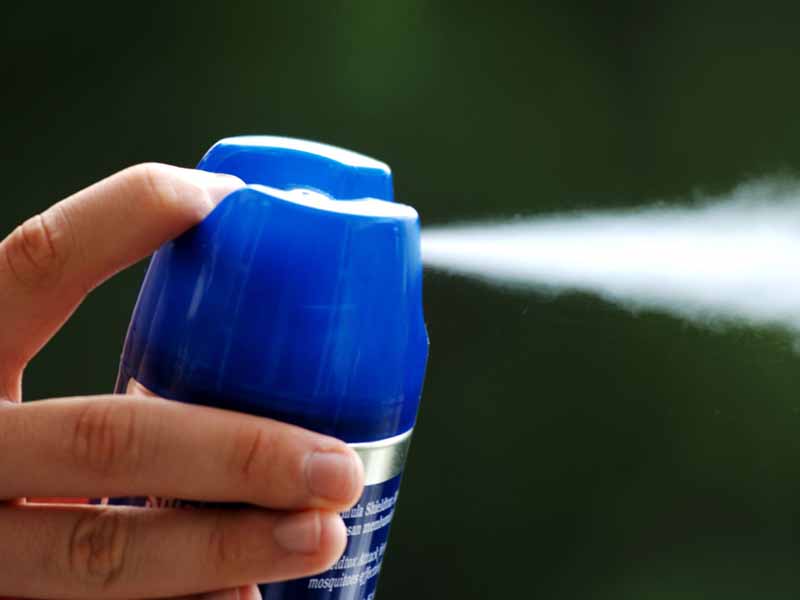Illnesses From Mosquito, Tick and Flea Bites Triple
May 08, 2018, 08:34 am News Staff – Illnesses from mosquito, tick and flea bites tripled in the United States from 2004 to 2016.
This meant more than 640,000 cases were reported to the CDC during this timeframe, which saw the introduction of nine new types of infections spread by mosquitoes and ticks.
These findings were included in the May 4 Morbidity and Mortality Weekly Report (MMWR) and its accompanying Vital Signs report from the CDC.
This is the first time the agency has summarized a collection of data trends for all nationally notifiable diseases caused by the bite of an infected mosquito, tick or flea.
"Zika, West Nile, Lyme and chikungunya -- a growing list of diseases caused by the bite of an infected mosquito, tick or flea -- have confronted the U.S. in recent years, making a lot of people sick. And we don't know what will threaten Americans next," said CDC Director Robert Redfield, M.D., in a news release. "Our nation's first lines of defense are state and local health departments and vector-control organizations, and we must continue to enhance our investment in their ability to fight against these diseases."

The CDC said widespread and difficult-to-control diseases from mosquito, tick and flea bites are major causes of sickness and death worldwide, and these diseases are an increasing risk in the United States. The agency said the country needs to better prepare for this public health threat.
Report Details
Researchers at the CDC analyzed data reported to the National Notifiable Diseases Surveillance System for 16 notifiable vector-borne diseases from 2004-2016 to identify trends. However, many infections weren't reported or recognized, so the agency said it was difficult to estimate the overall cost and burden of these diseases.
In 2016, the most common tick-borne diseases in the United States were Lyme disease and ehrlichiosis/anaplasmosis.
Story Highlights
The most common mosquito-borne viruses were West Nile, dengue and Zika, the CDC said.
And although it's rare, plague was the most common disease resulting from the bite of an infected flea.
Additional key findings from the MMWR included:
- the number of reported tick-borne diseases more than doubled in 13 years and accounted for more than 60 percent of all reported mosquito-borne, tick-borne and flea-borne disease cases; and
- from 2004-2016, seven new germs spread through the bite of an infected tick were discovered or recognized in the United States as transmittable.
The CDC said the increase in diseases caused by the bite of an infected mosquito, tick or flea in the United States can be attributed to many factors.
"Mosquitoes and ticks and the germs they spread are increasing in number and moving into new areas," the CDC said. "As a result, more people are at risk for infection."
In addition, the agency said the increase in overseas travel and commerce has contributed to this rise as well, with travelers potentially becoming infected with a mosquito-borne disease, such as Zika virus, in another country and then unknowingly transporting it to the United States.
"The data show that we're seeing a steady increase and spread of tick-borne diseases, and an accelerating trend of mosquito-borne diseases introduced from other parts of the world," said Lyle Petersen, M.D., M.P.H., director of the Division of Vector-Borne Diseases in the CDC's National Center for Emerging and Zoonotic Infectious Diseases, in the release. "We need to support state and local health agencies responsible for detecting and responding to these diseases and controlling the mosquitoes, ticks and fleas that spread them."
The CDC said these state and local health agencies need additional capacity for tracking, diagnosing and reporting cases; controlling mosquitoes and ticks; and preventing new infections; and for the public and private sector to develop new diagnostic and vector-control tools.
Protection Recommendation Refresher
Family physicians can remind patients to protect themselves from mosquito, flea and tick bites by
- using an EPA-registered insect repellent;
- wearing long-sleeve shirts and long pants;
- treating boots, pants, socks, tents and other items with permethrin or using permethrin-treated clothing and gear;
- taking steps to control ticks and fleas on pets;
- finding and removing ticks from family and pets; and
- taking steps to control mosquitoes, ticks and fleas inside and outside your home.
Related AAFP News Coverage
Guest Editorial: Cutting Global Health Programs Puts Americans at Risk
(2/22/2018)
Local Zika Transmission in U.S. Tied to Rise in Birth Defects
(1/30/2018)
More From AAFP
American Family Physician: Emerging Vector-Borne Diseases
(10/1/2016)